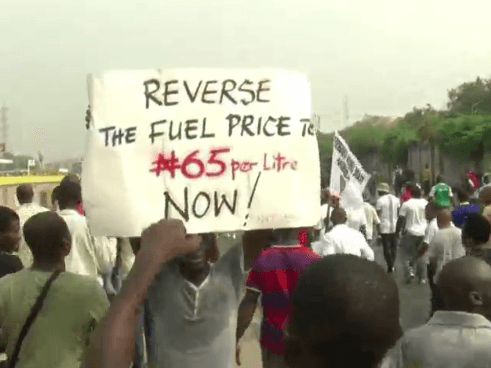Nigeria grinds to a halt as general strike enters day two
Protesters with signs crowded the streets of Lagos Monday and Tuesday, demanding the government of Nigeria reverse its decision to end the local oil subsidy. (Photo from AFP video.)
About 10,000 people participated in an indefinite strike against the government in Nigeria on Monday.
The protests were motivated by accusations of corruption, as well as the government’s decision to eliminate a fuel subsidy — sending prices skyrocketing across the country. Prices have climbed from the equivalent of about $1.51 a gallon to more than $3.25 per gallon, virtually over night.
Meanwhile, terrorist attacks by the radical Islamist group Boko Haram, who most recently claimed responsibility for a Christmas Day church bombing that killed 37 people and wounded 57, have reached a fever pitch.
Mark Lobel, the BBC’s reporter in Nigeria, said streets in the capital of Lagos are all but empty. Lobel said it’s been a peaceful strike thus far.
“Over night, we found out the unions had met with government officials and no deal had come from that meeting,” he said. “Today, we have one new union joining the strike, the oil and gas workers’ union.”
He said while the old gas prices certainly were cheap, on an international scale, when you consider that most Nigerians earn less than $2 per day and need gas for heating and transportation, this price increase “strikes at the heart of Nigerians.”
Lobel said protesters seem to be having a good time — enjoying almost a carnival-like atmosphere — at least in the capital.
“People have been giving out ex-presidents’ phone numbers for the crowd to ring up and, I guess, harass somewhat,” Lobel said.
In other parts of the country, though, protesters have been shot and killed by police. A curfew was put in place over night.
John Campbell, former U.S. Ambassador to Nigeria, said we should all be thankful that the protests in Lagos, home to some 17 million people, have remained peaceful.
“Whenever you have a place that’s that big, the mood can change really quite rapidly,” he said.
Oil and gas make up about 90 percent of Nigeria’s exports and generate about 80 percent of the government’s funding. Most Nigerians, however, receive no tangible benefit from the country’s oil exports except for the fuel subsidy.
“There’s a very strong sense among the Nigerian people, that the oil and the gas were placed in Nigeria by God, and that that oil and that gas belongs to them as Nigerians,” he said.
The Nigerian government’s actions to sort of back away from that idea is tantamount to igniting a powder keg, Campbell said.
But this isn’t the first time. Many government, civilian and military, have tried to reduce or eliminate the fuel subsidy, only to back down in the face of a popular uprising.
Campbell pointed out that of the 165 million people living in Nigeria, many live on less than $1 a day. Fuel price increase can have a cataclysmic impact on those people. The increase covers not just gasoline, and kerosene, which is used for heating homes, but also cooking oil, Campbell pointed out.
